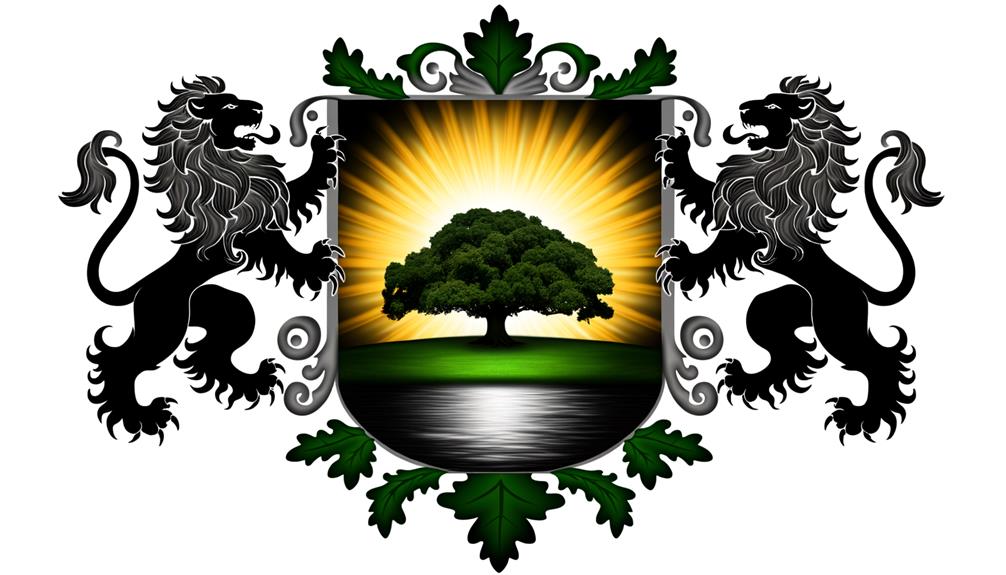The Meaning of the Name Kingsley
The name Kingsley is derived from Old English, combining 'cyning' (king) and 'leah' (clearing or meadow), signifying 'king's meadow.' This etymology reflects Anglo-Saxon linguistic traditions, imparting both regal authority and pastoral tranquility. Historically, Kingsley indicates a noble heritage and resonates with social status and geographical identity.
Notable figures like Sir Ben Kingsley and Charles Kingsley have further elevated its prestige. In literature, the name embodies leadership and nobility, aligning with its etymological roots.
Modern iterations of Kingsley retain a harmonious blend of power and peace, making it a distinctive choice for parents today. Explore further to appreciate its cultural resonance.

Key Takeaways
- Kingsley means 'king's meadow,' derived from Old English.
- Combines 'cyning' (king) and 'leah' (clearing/meadow), reflecting regal and pastoral themes.
- Symbolizes nobility, leadership, and a harmonious blend of power and peace.
- Associated with notable figures and places, adding historical and cultural significance.
- Represents resilience, grace, and timeless elegance in modern interpretations.
Origins of Kingsley
The name Kingsley originates from Old English, combining the elements 'cyning,' meaning 'king,' and 'leah,' meaning 'clearing' or 'meadow.'
This nomenclature reflects a rich historical context where Anglo-Saxon linguistic traditions often incorporated elements of the natural environment and societal hierarchy. Kingsley evokes imagery of a regal pastoral landscape, perhaps signifying land granted or owned by a king.
This duality of royal and pastoral elements suggests the name may have originally denoted a place of significance within a monarch's domain. Such names were not uncommon in Old English toponymy, where descriptive compounds frequently delineated both geography and ownership.
The linguistic structure of Kingsley, hence, offers insight into the socio-cultural fabric of early medieval England.
Etymology Explained
Etymologically, Kingsley derives from the Old English elements 'cyning' (king) and 'leah' (clearing or meadow), reflecting both regal and pastoral connotations. The compound form 'cyning-leah' signifies a place where a king might reside or a meadow associated with royalty, indicating a noble heritage embedded in the landscape.
This duality of meaning underscores a blend of authority and tranquility, suggesting a harmonious balance between leadership and nature. The linguistic construction provides insight into Anglo-Saxon naming conventions, where geographic and hierarchical aspects were often intertwined.
The term 'leah' itself, common in Old English toponyms, denotes open land suitable for agriculture or settlement, further enriching the name's historical and cultural resonance.
Historical Context
Throughout history, the name Kingsley has been associated with various notable figures and places, reflecting its enduring significance and adaptability across different eras and cultures. Originating from Old English, the name Kingsley, meaning 'king's meadow,' has appeared in various historical records and literary works. Its usage spans from medieval England to contemporary times, signifying social status and geographical identity. The name has been borne by influential individuals and places, contributing to its lasting presence.
- Kingsley Amis: A renowned British novelist and poet.
- Kingsley Plantation: An important historical site in Florida, USA.
- Kingsley School: Prestigious educational institutions in the UK.
- Kingsley, Staffordshire: A village with historical significance in England.
- Kingsley College: Known for academic excellence in Australia.
Cultural Significance
The name Kingsley carries profound cultural significance, rooted in its historical evolution from an Old English surname denoting 'king's meadow.' Its presence in literature, symbolizing nobility and leadership, further underscores its enduring impact.
This discussion will examine how the name's historical roots and literary symbolism have shaped its cultural resonance.
Historical Roots and Evolution
Rooted in Old English, the name Kingsley has evolved greatly over centuries, reflecting its deep historical and cultural significance. Originally derived from the Old English words 'cyning,' meaning king, and 'leah,' meaning meadow or clearing, Kingsley has been emblematic of royal heritage and natural beauty.
This name has traversed through various linguistic and cultural landscapes, maintaining its regal connotations.
- Etymology: Derived from Old English 'cyning' and 'leah'
- Historical Usage: Popular among Anglo-Saxon communities
- Geographical Spread: Common in England, later adopted in other English-speaking regions
- Cultural Adaptations: Appeared in various forms in literature and folklore
- Modern Usage: Retains prestige and a sense of nobility
This evolution underscores Kingsley's enduring resonance across different eras and societies.
Symbolism in Literature
Often symbolizing nobility and leadership, the name Kingsley frequently appears in literature as a representation of royal lineage and inherent greatness. Historically, the name derives from Old English elements ‘cyning,’ meaning ‘king,’ and ‘leah,’ meaning ‘wood’ or ‘clearing. ‘ This combination suggests a regal presence rooted in natural strength. In addition to its association with monarchy, the name Kingsley also holds significance in the history of the name bishop. This dual symbolism ties the name to both secular and religious authority, further emphasizing its connotations of leadership and influence. Throughout the centuries, individuals bearing the name Kingsley have continued to embody these qualities, leaving a lasting legacy of power and prestige.
Literary works, such as J.K. Rowling's 'Harry Potter' series, feature characters named Kingsley who embody these ideals, reinforcing the name's cultural significance. Linguistically, Kingsley connotes a sense of authority and moral rectitude. Authors employ this name to evoke an image of uprightness and valor, aligning with traditional archetypes of kingship.
Consequently, Kingsley serves as a potent literary symbol, encapsulating themes of power, virtue, and noble heritage.
Famous Namesakes
The name Kingsley has been borne by a variety of notable individuals across different spheres, prominently including the acclaimed actor Sir Ben Kingsley, whose illustrious career has left a significant mark on the film industry.
Historical figures such as Charles Kingsley, a 19th-century clergyman and writer, have contributed to its enduring legacy.
Additionally, the name appears in literature, exemplified by Kingsley Shacklebolt, a character in J.K. Rowling's Harry Potter series, highlighting its appeal in fictional narratives.
Renowned Actors Named Kingsley
Among the notable actors named Kingsley, Sir Ben Kingsley stands out as a prominent figure in the world of cinema, renowned for his versatile performances and distinguished career. Knighted in 2002, Kingsley has portrayed a wide range of characters, demonstrating linguistic and emotional depth. His portrayal of Mahatma Gandhi in the 1982 film 'Gandhi' earned him an Academy Award for Best Actor, solidifying his place in cinematic history.
- Academy Award for Best Actor for 'Gandhi' (1982)
- Knighted by Queen Elizabeth II in 2002
- Renowned for his role in 'Schindler's List' (1993)
- Celebrated for performances in 'House of Sand and Fog' (2003)
- Starred in 'Iron Man 3' (2013) as Trevor Slattery
Kingsley's contributions to film exemplify the name's association with excellence and distinction.
Historical Figures Named Kingsley
Beyond the world of cinema, the name Kingsley also holds historical significance, with notable figures such as Charles Kingsley, a 19th-century clergyman, historian, and novelist, contributing to its distinguished legacy.
Charles Kingsley was an influential thinker during the Victorian era, known for his progressive views and literary prowess. His works, including 'The Water-Babies' and 'Westward Ho!', reflect his commitment to social reform and environmental conservation. As a historian, he provided critical insights into early English history, blending rigorous scholarship with narrative flair.
The etymology of Kingsley—derived from Old English, meaning 'king's meadow'—resonates with his stature, symbolizing a place of intellectual and moral guidance. Therefore, Kingsley's name endures in historical and cultural memory.
Literary Characters Named Kingsley
Several iconic literary characters named Kingsley have left an indelible mark on the pages of fiction, enriching narratives with their distinct personalities and story arcs. These characters, emerging from various genres and historical contexts, demonstrate the name's versatility and enduring appeal.
- Kingsley Shacklebolt: A steadfast Auror in J.K. Rowling's *Harry Potter* series, symbolizing strength and justice.
- Kingsley Amis: While not a character, his novels often feature personas that reflect his own complex identity.
- Kingsley Quinn: From the *Infernal Devices* series by Cassandra Clare, contributing to the rich tapestry of Victorian fantasy.
- Kingsley in *Kingsley* by Holroyde: A pivotal figure in the narrative, embodying moral dilemmas.
- Kingsley in *Kingsley's Adventure* (video game): Bridging literary and interactive storytelling.
These Kingsleys reflect diverse thematic elements, enriching literary landscapes.
Kingsley in Literature
In literary history, the name Kingsley has been prominently immortalized through the works of English author Charles Kingsley. His contributions to Victorian literature remain influential. Kingsley's novels, such as 'Westward Ho!' and 'The Water-Babies,' offer profound insights into societal norms and the human condition. His writing, characterized by its didactic tone and rich narrative style, reflects the complexities of 19th-century England.
Linguistically, the name Kingsley—meaning 'king's field'—carries connotations of nobility and authority, which resonate within his works' themes. His integration of historical and social commentary within his fiction underscores his literary prowess, cementing his legacy in the annals of English literature. The name Kingsley embodies both historical significance and literary excellence.
Popularity Trends
While the name Kingsley has left an indelible mark in literary history, its popularity has fluctuated over time, reflecting broader sociocultural shifts.
Initially, Kingsley gained traction in the 19th century, influenced by notable literary figures such as Charles Kingsley.
However, its presence waned throughout the early 20th century, mirroring a decline in Victorian-era names.
The latter half of the 20th century saw sporadic resurgence, often linked to cultural touchpoints in media and literature.
- 19th-century rise: Prominence due to literary figures.
- Early 20th-century decline: Reflects broader name trends.
- Mid-20th-century resurgence: Cultural and media influences.
- Late 20th-century stability: Consistent, moderate use.
- 21st-century trends: Renewed interest in classic names.
This historical ebb and flow underscores the dynamic nature of name popularity.
Modern Interpretations
Embracing contemporary sensibilities, the name Kingsley has evolved to embody notions of nobility, strength, and timeless elegance. This evolution is rooted in its linguistic origins, combining the Old English "cyning" (king) and "leah" (wood or clearing). Historically, the name conjures images of regal authority and pastoral tranquility, reflecting a harmonious blend of power and peace.
| Attribute | Modern Interpretation |
|---|---|
| Nobility | Symbolizes leadership and dignity |
| Strength | Represents resilience and fortitude |
| Elegance | Evokes a sense of timeless grace |
In modern contexts, Kingsley is appreciated not only for its historical gravitas but also for its adaptability to contemporary values. As societal attitudes shift, the name retains its prestigious aura while resonating with modern ideals of character and poise.
Choosing Kingsley Today
Selecting the name Kingsley in contemporary society often reflects a desire to impart qualities of leadership, resilience, and grace onto the next generation. This name, with its etymological roots in Old English, combines 'king' and 'lea' (meaning meadow or clearing), suggesting a noble and serene association.
Historically, Kingsley has been linked to influential figures in literature and politics, enhancing its perception as a name of stature and intellect.
Linguistically, Kingsley is distinctive yet approachable, making it a compelling choice for modern parents.
Conclusion
In summation, the name Kingsley, with its etymological roots in Old English, denotes 'king's meadow.' Historically, it evokes images of pastoral landscapes tied to regal authority.
Its cultural significance is reflected through notable figures and literary characters, contributing to its enduring appeal.
The modern resurgence of Kingsley as a chosen name underscores a timeless connection to heritage and nobility.
Much like the legendary Arthurian tales, Kingsley bridges the past and present, embodying both tradition and contemporary relevance.






